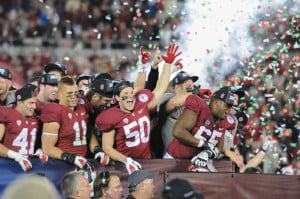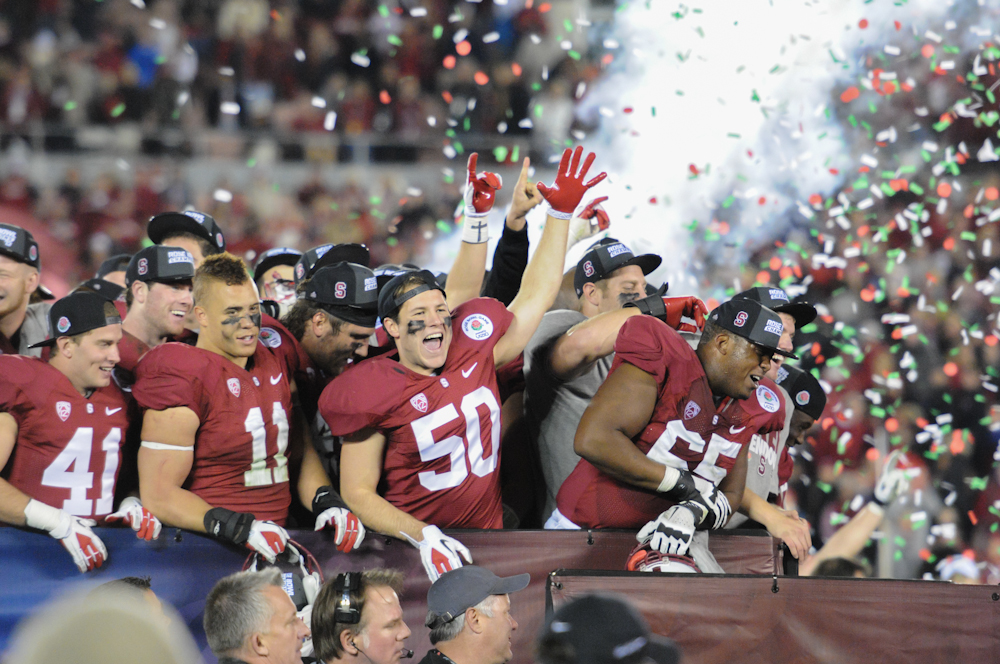Stanford’s loss to Utah on Saturday all but ended its chances for a national title this season. As it often does, the Cardinal struggled to pull away from an underdog; the difference this time was that the Utes took advantage. On one hand, head coach David Shaw has often defended his team’s conservative play calling and penchant for cutting it close. On the other hand, Stanford’s inability to blow out opponents has left it exposed to losses like Saturday’s, and in college football, teams are expected to be perfect for 14 weeks if they hope to compete for the crystal trophy. That’s why we asked football writers Winston Shi, David Cohn and Do-Hyoung Park: Is this Stanford team just not built to win a national championship?
Winston Shi: I agree with the premise, as I’ve mentioned it before in a previous column. Teams vary from week to week, but regardless, I don’t think Stanford is a national championship team.

David Shaw slows the game down on offense as a benefit to the defense, but in doing so, he also allows low-probability events to have more of an effect on a game—what financiers call “black swans.” If Stanford is truly the better team, it needs more opportunities to reduce the effect of randomness. Slowing the game down takes away time, and time is to an offense as oxygen is to a flame.
More ironically, Stanford emphasizes the run in order to avoid randomness, to get the consistent 4- to 5-yard gain instead of the sporadic 10- to 12-yard gain. Kevin Hogan played pretty well, but he needs to learn the offense better so that Stanford doesn’t have to eat up clock sending in play calls. That will allow the offense to begin playing with speed—if not throughout the game, then at least during critical moments.
Now, I love Stanford’s throwback power running, max-blocking schemes and deep play action. It’s multiple, it’s confusing to the defense and it will win games. But all in all, Stanford isn’t executing that game plan on offense right now.
On defense, Stanford’s philosophy is to wait for either a penalty, a sack, a couple small mistakes or a turnover—but the level of offensive execution is getting better and better. It’s hard to overestimate just how important getting to third-and-long and then relying on the pass rush has been to Stanford. But even when Utah threw the ball around, they got third and shorts. Opposing offenses aren’t going to make mistakes. Stanford is going to have to force them to do so. If the Cardinal doesn’t have the horses or the discipline in the secondary to play some man coverage, it probably doesn’t deserve to win a national championship.
Derek Mason changed things up late in the Utah game—mixing in more press coverage and exotic blitzes—but by then it was too late. Stanford still controls its Pac-12 destiny, but UCLA’s Brett Hundley is a very talented passer who, if Stanford doesn’t sit him down repeatedly, can march the Bruins down the field and crush Stanford’s remaining Rose Bowl hopes.
David Cohn: Before I get into the heart of my response, let me first discuss the previous assertion that all teams that are selected to play in the National Championship have to be perfect. That is simply not true. In fact, in previous years, Alabama twice won the national championship after losing a regular season home game.
In addition, LSU won a national championship in 2007 after losing twice during the regular season, including a home loss while ranked No. 1 in the nation to an unranked Arkansas team that finished the season 8-5. To prove that this string of imperfection is not limited to SEC schools, Ohio State, LSU’s opponent in that 2007 BCS National Championship, also lost at home while holding the No. 1 ranking to a then-unranked Illinois squad.
In fact, it is becoming increasingly more difficult for AQ-teams to make it through their seasons unscathed, as only two teams finished the regular season last year without a loss: Notre Dame and an ineligible Ohio State team. This phenomenon means that it has been three years since a national championship game last featured two undefeated squads.
Ultimately, this now-frequently incorrect notion of perfection is the reason why we have to answer the question of whether Stanford is built to a national championship, since a majority of the national pundits have already written off the Card’s chances of winning this year.
No one knows how the season is going to play out for Stanford, nor any other team for that matter. In particular, I have heard this sentiment several times already: “Stanford can’t make the national championship game because Ohio State (or Florida State or Clemson) is going to go undefeated.” The people who made these assertions may be right, and these teams may not lose on their way to possible national championship berths. However, by the same token, no one saw West Virginia losing to Pitt in December 2007, Oklahoma State losing to Iowa State in November 2011 or even Oregon losing to Stanford last November.
Therefore, I cannot judge whether this Cardinal team is or is not built to win a national championship until the season has run its course.
Do-Hyoung Park: The bottom line is: regardless of what David Shaw says, style points matter. The Coaches poll is voted on by people not named David Shaw. As is the Harris poll. When the pollsters will ultimately determine which team to rank at No. 1 and No. 2 in December, who will they put ahead: a one-loss Oregon (not to say that the Ducks will lose) sporting a 45-point win over Tennessee of the SEC or a one-loss Stanford (not to say that the Cardinal will win out) with just a 14-point win over… um… Army?
I do believe that this Stanford team does have the talent and the personnel to bring home the crystal football. Despite the questionable secondary on the defensive side, the offense has really come into its own. Kevin Hogan is maturing and making better throws and decisions (admittedly, more work is needed on the latter). Ty Montgomery can change games. Tyler Gaffney is a workhorse. Kelsey Young can do amazing things with an open field. Devon Cajuste has looked like Zach Ertz at times.
Stanford’s brand of football will win games. That’s a tried and true statement that the last half-decade of Stanford football has shown. I’m in no position to criticize David Shaw. But in this day and age, with lighting up scoreboards being synonymous with championship-caliber teams to many around the nation (see: Baylor hype), isn’t it time to adapt to the times? Why not push the pedal to the metal and see what happens?
While Stanford is certainly built like a BCS Championship team—the Cardinal’s depth on both sides of the ball is almost unparalleled—it is still being coached with a Rose Bowl mindset. Things change when you’re a championship-caliber team and all eyes are on you. And until Shaw can make championship calls—up the tempo when needed, lose the conservativeness, use Kelsey Young(!)—a Rose Bowl team is all Stanford will be.
David Cohn hopes his positivity will keep him safe from Shayne Skov’s fury. To let him know what you think, email David at dmcohn ‘at’ stanford.edu, and to give Winston and Do good hiding places on campus, email them at wshi94 ‘at’ stanford.edu and dpark027 ‘at’ stanford.edu.
